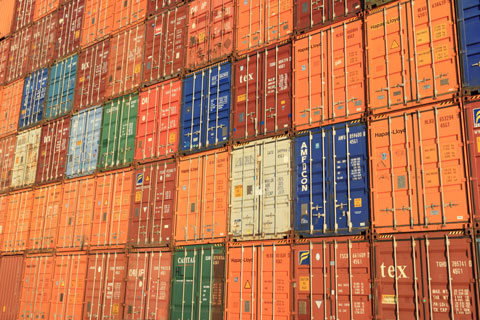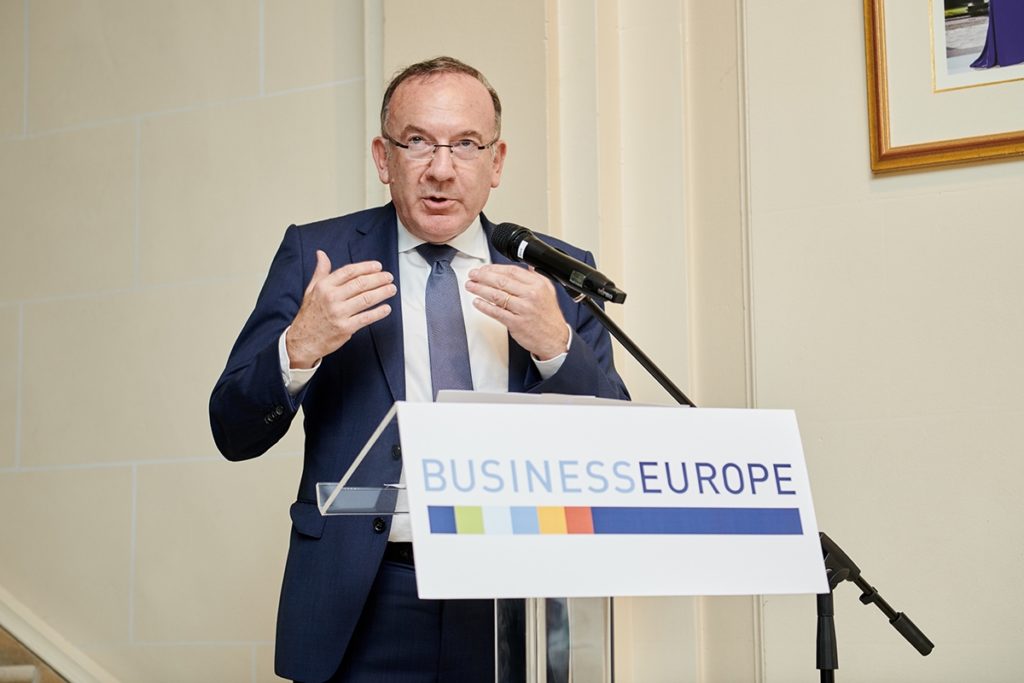
Increasing opportunities in Ukraine for Greek Exporters
Interview with H.E. Mr. Sergii Shutenko, Ambassador of Ukraine to Greece to Ms. Dina Athanasiou, Associate Advisor, International Relations & Regional Policy, SEV
D.Athanasiou: Your Excellency, Greece is currently trying to strengthen its bilateral relations and expand its trade opportunities. Looking forward to the next day of Ukraine’s post-war recovery, do you believe there are opportunities for the Greek companies in Ukraine? Is Ukrainian entrepreneurship familiar to Greek products and services?
Ambassador: For over a year, Ukraine has faced unprecedented challenges due to full-scale military aggression against our country. Nevertheless, we remain steadfast in our defence of territories and continue to conduct business.
45 Greek-registered companies were active in Ukraine before the war started. Most were engaged in the supply of foodstuffs and seasonal farm goods, corporate consulting, tourism and in the food and beverage sector and also in crewing for ocean-going vessels. So, the Ukrainians are familiar to Greek products and services.
Ukraine is known for skilled labor force and high education level. Ukraine is 21st in The Global Skills Index 2022 mostly in consequence of skills that involve computer science and applied mathematics, software engineering, big data, and machine learning.
Ukraine is historically known as the “bread basket of Europe”. Ukraine is in the top of global ratings: 1st exporter of sunflower oil, 2nd in export of ferro-silico-manganese, 3rd exporter of maize, barley and rape.
I am sure that our countries have opportunities for the fruitful bilateral cooperation.
D.Athanasiou: What about the opportunities on the investment level? Are there any with mutual interest? And if so, in which sectors?
Ambassador: One of the prospective spheres is energy. Greece has a huge experience in renewable energy. It is among the global leaders in terms of penetration of renewable energy sources (RES), according to the latest report by Ember, which focuses on the international energy sector for 2022. Greece took the seventh place internationally.
Wind is the most substantial and promising source of renewable energy in Ukraine, its solar capabilities are also exceptional. With above average wind speeds, solar irradiation and an increasing amount of agricultural waste, Ukraine’s renewables sector is poised for rapid growth. Ukraine’s above-average annual amount of solar irradiation (more than Germany, the industry leader) makes Ukraine an exceedingly attractive producer of solar energy, particularly for existing industrial facilities and the growing agribusiness sector.
IT sphere is also very promising. Amid the 2021 global lockdown, Ukraine’s IT industry showed a 20% growth and gaining a worth of more than $6 billion. Ukraine is a leading IT outsourcing destination in Europe, it has a large talent pool of 200,000 IT professionals, and strong tech education. Ukrainian software developers are recognized among the 5th strongest IT professionals globally thanks to their solid technical expertise, knowledge of emerging disciplines (Go, AI, big data, blockchain, etc.).
Ukraine maintains leading positions in production and exports of cereal grains. The annual cereal crop reaches over 70 million tons. Given the domestic market needs, Ukraine can export approximately 50 million tons of cereal grains annually. Ukrainian agriculture, already enjoying substantial cost advantages due to attractive land rent prices, extremely fertile soil, competitive wages and logistics, still has plenty of headroom for productivity growth as the yields per hectare remain below Western benchmarks.
With additional investments in management, education, irrigation, farming techniques, logistics and value-added production, Ukraine is poised to double its food exports. It can be interesting for the Greek investors.
Shipping and related activities are also promising spheres for investment. I believe that after the war we might renew talks on investing in the Ukrainian infrastructure, in particular ports.
D.Athanasiou: Considering that a Greek company examines its entry market strategy in Ukraine, are there any special factors (tax-oriented etc.) that should be taken into account?
Ambassador: Ukraine has introduced a number of import relaxations to ensure efficient operation of customs formalities during martial law.
Temporarily, until the termination or abolition of martial law on the territory of Ukraine, taxpayers under single tax groups I to III, may use the simplified procedure for declaring goods by submitting a preliminary customs declaration containing all the necessary information for the release of goods in accordance with Article 259 (5) of the Customs Code of Ukraine.
Customs clearance of goods shall be completed as soon as possible, but not more than one working hour from the date of presentation to the customs authority of goods, commercial vehicles subject to customs clearance, submission of a customs declaration or a document replacing it in accordance with law.
The payment for the performance of customs formalities by the customs authorities outside the location of the customs authorities or outside the working hours established for them shall not be charged.
Customs formalities may be performed by another customs authority, including without presenting such goods to this customs authority, under the coordination of the State Customs Service, if the customs authority does not fulfil the tasks assigned to customs authorities due to martial law.
A temporary suspension on the initiation and continuation of documentary customs audits of compliance with the requirements of the legislation of Ukraine on customs, including timeliness, reliability, completeness of accrual and payment of customs payments, has been introduced until the termination or abolition of the martial law.
On 27 July 2022, the law of Ukraine No. 2445-IX came into force, which provides for the exemption from import duty of products and equipment for the storage, transportation, loading and unloading of grain and/or oil crops when imported into the customs territory of Ukraine during the period of martial law and for 30 days from the date of its termination or cancellation, in particular:
– polymer sleeves and bags with a volume of at least 0.8 cubic meters for storing agricultural products;
– self-loading or self-unloading trailers and semi-trailers for transporting agricultural products.
On 4 June 2022, Regulation 2022/870 of the European Parliament and of the Council on temporary trade-liberalization measures entered into force. This decision complements the opportunities available to Ukrainian exporters under the EU-Ukraine Association Agreement.
Now the tariffs stipulated in the Agreement will be temporarily suspended. These are, in particular:
- duties on industrial products;
- suspension of the entry price system for fruits and vegetables;
- suspension of all tariff quotas for agricultural products;
- suspension of anti-dumping duties on imports of goods originating in Ukraine;
- suspension of global safeguards against Ukrainian goods.
D.Athanasiou: Fast forward to 5 years from now, how do you foresee the trade landscape between our two countries?
Ambassador: Fast forward to 5 years from now I foresee increase in trade between our countries. Promising spheres for the bilateral cooperation are energy sector, IT, agri-food and transport.
Greece becomes most important hub for alternative gas in Southeast Europe, Ukraine rebuilds from the war and seeks to implement long-term goals to diversify its energy sources. This cooperation could be mutually beneficial.
Ukrainian businesses have impressively adapted to the current situation, demonstrating extraordinary resilience in a volatile environment. Near 85 percent of enterprises have resumed operations by the end of 2022. Ukraine is a resilient nation. Ukraine has demonstrated its ability to cope with even the most difficult of challenges.
As one of the region’s largest countries with vast natural resources and a well-educated population, Ukraine has the potential to be a major economic engine for the region.
Investing in Ukraine’s future will also serve Europe’s own long-term interests.
Athanasiou: Thank you your Excellency for this fruitful and interesting interview.










